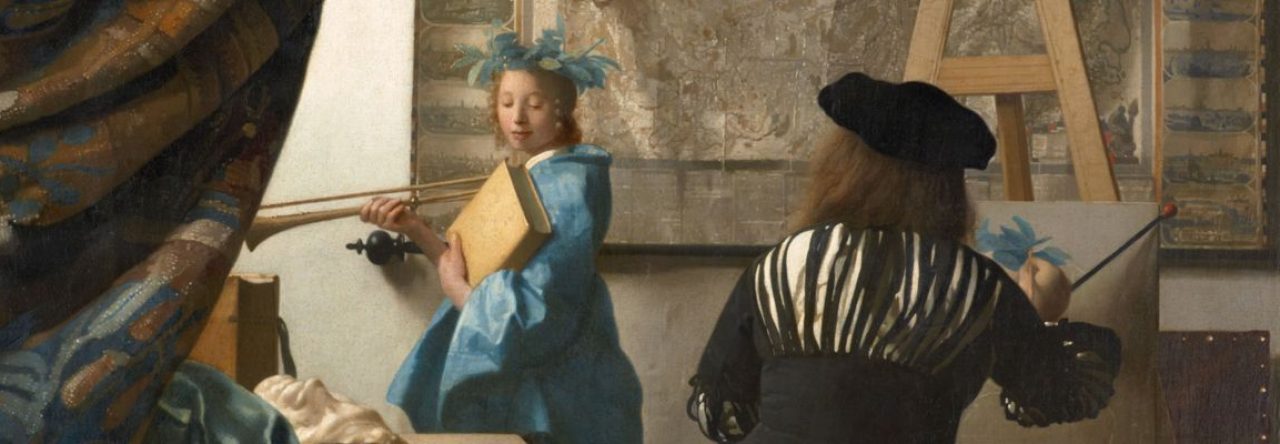[Many pics, please allow for download]
Valeria Messalina (AD 17-20? – 48) was the original Roman floozie and is immortalized in paintings, sculptures, stage productions, films and novels. As in the case of other scandalous women of the Roman world – Julia the Elder, Theodora and Cleopatra, it is hard to say how much in the historical reports is invective – slander for political gain – and how much is true, or, at least, probable.

The present author somewhat tends to see the political (in her case, that is, murderous) incidents as more likely than the sexual allegations – sexual defamation and innuendo were par for the course in ancient Roman political discourse. Accusations of sexual misconduct and in particular of adultery were indeed rather suitable political weapons – in particular because of the incongruity of official Roman morals as declared in many laws – e.g. Imperator Augustus’ own Lex Iulia de adulteriis – when compared to Roman reality, which in this respect resembled a gigantic bordello – given that prostitution was always legal in the empire and sex with slaves was essentially unregulated and common.

The main source behind the allegations was, perhaps, originally Agrippina the Younger, who followed Messalina on the throne and into the emperor’s bedchamber. It remains an open question whether she was worse than her contemporaries or not – the ladies of the Julio-Claudian dynasties are generally not remembered for chastity and restraint.
Ms. Agrippina was a busy bee in her own right, and was later rumoured – with the aid of the famous preparer of poisons Locusta – to have poisoned not only her husband Claudius but Britannicus as well, on Nero (her son’s) behalf. It did not help her much in the end – Nero had her eventually removed.

By all reports Messalina must have been quite the catch and a feast for the eyes. Her relation to the Imperial family was intimate. Her family, the gens Valeria, was one of the most ancient and honoured patrician families of Rome. She was the daughter of Domitia Lepida the Younger, a great niece of Augustus and her first cousin Senator Marcus Valerius Messalla Barbatus (the rest may be read on Wiki). Both her grandmothers had been not only half-sisters, but also nieces of Augustus Caesar.


We do not know much of her life before she became the third wife to heir presumptive Claudius – who was her own cousin (once removed) – in AD 38. If one reads a bit about the whole Julio-Claudian dynasty, one may easily get the impression that it was but one incestuous clan – and may not be far off the truth. She bore Claudius two children – Octavia (later Nero‘s wife) and Britannicus. When Caligula was murdered in AD 41, her husband was made E
She realized early that Claudius’ adopted son Nero was a main competitor for her son Britannicus in the imperial succession (although we must remember here that adoption might change the order of succession at any time). What she did about it and what followed is, however, largely conjecture – based on somewhat dubious historical reports.

In general, historians blame her in three regards: that she mingled in the imperial succession to advance her son Britannicus respectively her lovers, that she conspired against various senators for financial gain and, it seems, out of sexual motives, and that she was both adulterous and promiscuous – crimes for which exile was the normal sanction – but for an empress, the death penalty was far more likely. “Adulterium” respectively “Stuprum” – the shame – were crimes of the woman in question only, not the man – apparently the Romans concluded that no “Latin lover” could resist the ladies’ allures …
She is blamed for the executions of Claudius’ nieces Julia Livilla and Julia Livia, of the prominent senators Appius Silanus and Valerius Asiaticus – the former actually being married to Messalina’s mother Domitia Lepida but apparently desired by the daughter, whom he refused – the poisoning of Marcus Vinicius (Consul AD 30) – who is said to have resisted her advances as well – and the execution of the freedman Polybius, Claudius’ private secretary.
Julia Livilla seems to have been involved (AD 39) in a conspiracy to overthrow Caligula and replace him with Marcus Aemilius Lepidus, both her and her elder sister Agrippina‘s lover. She was punished by exile but returned after Caligula’s assassination, only to get in trouble with Messalina in AD 41 and was charged by Claudius (who was her paternal uncle) with adultery, committed, it was said, with Seneca the Younger, She was exiled again and apparently starved to death on Claudius’ orders sometimes in AD 42.
Julia Livia, granddaughter of Tiberius, fell the same way to apparently false charges of immodesty and adultery reported on orders of Messalina to Claudius’ ears by her palace spies, mostly freedmen, and was executed around the same time as Livilla. In both cases there seemed to have been no evidence to the alleged crimes and no official investigation was carried out.

The case of Appius Silanus was different. It seems that Messalina herself desired the highly honoured senator, who, as remarked, was married to her mother Domitia Lepida. On his refusal, Messalina and the aforementioned Narcissus reported an assassination plot, which they claimed to have seen in their dreams, to the emperor and the poor man was promptly executed for treason.

Not lust but greed seemed to have been the driving force in Messalina’s persecution of Valerius Asiaticus. He was one of the richest and most prominent men in Rome, having been consul not once but twice, and had bought and further developed the already famous gardens of the legendary Lucius Licinius Lucullus. It would seem that Messalina brought the notorious senator Publius Suillius Rufus (Claudius’ favoured prosecutor) – by what means we do not know, but we can guess – to indict Asiaticus on capital charges – along the usual conspiracy against the state also a charge of adultery with Poppaea Sabina the Elder, mother of the current empress Poppaea Sabina. He was duly found guilty and committed suicide in AD 47. Messalina inherited the gardens when she followed Poppaea Sabina as empress.
Marcus Vinicius was not so easy to crack. He had been consul twice and was a highly decorated officer – apparently above reproach – so he was poisoned. About the reasons for the execution of Polybius we do not know much – gossip holds that Messalina was tired of him as a lover and sought a secretary to Claudius who was more, er, pliable – in her expert hands.
The interesting question is whether or not Claudius was clueless about his wife’s actions – he probably turned a blind eye since they were getting rid of his political enemies, and – simpleton that he was or seemed to be – he could later deny that he knew anything about her actions.
Executions for crimes against the state were everyday occurrences in Roman politics but as their occasions multiplied, senators fearing to share the fate of Silanus and Asiaticus seemed to have started their own smear campaign. A few juicy scandals might, perhaps, advance their designs.


Rumours and innuendo of sexual adventures was as common and prevalent in Rome as in any other place, but gossip about the orgies Messalina was reported to host privately and not-so-privately quickly spread everywhere. The story everyone recalls best is the one on the competition in regard to sexual stamina which Messalina reportedly fought out with the prostitute Scylla, to find out who could satisfy more men in twenty-four hours – which Messalina is said to have won with a score of twenty-five lovers – as Pliny the Elder‘s Natural History relates in Chapter 83, n. 237:
Messalina, the wife of Claudius Caesar, thinking this a palm quite worthy of an empress, selected, for the purpose of deciding the question, one of the most notorious of the women who followed the profession of a hired prostitute; and the empress outdid her, after continuous intercourse, night and day, at the twenty-fifth embrace.


Juvenal described her habits in Satire VI as follows:
Then look at those who rival the Gods, and hear what Claudius endured. As soon as his wife perceived that her husband was asleep, this august harlot was shameless enough to prefer a common mat to the imperial couch. Assuming night-cowl, and attended by a single maid, she issued forth; then, having concealed her raven locks under a light-coloured peruque, she took her place in a brothel reeking with long-used coverlets. Entering an empty cell reserved for herself, she there took her stand, under the feigned name of Lycisca, her nipples bare and gilded, and exposed to view the womb that bore thee, O nobly-born Britannicus! Here she graciously received all comers, asking from each his fee; and when at length the keeper dismissed his girls, she remained to the very last before closing her cell, and with passion still raging hot within her went sorrowfully away. Then exhausted by men but unsatisfied, with soiled cheeks, and begrimed with the smoke of lamps, she took back to the imperial pillow all the odours of the stews.

What seems to have broken her neck was a party she held on the occasion of a visit of her husband, Emperor Claudius, to the harbour and shipyards of Ostia he was building there. In his absence, his wife gave a lavish party. The freedman Tiberius Claudius Narcissus, another secretary and magistrate, decided to inform his boss about the licentious affair – he had his own reasons in regard to Britannicus, Messalina’s son (check the link, it is interesting).
We have reason to believe that, in his report, Narcissus took a few liberties with the facts or at least with what he could prove. He told his employer that his wife had indeed performed a wedding ceremony with a certain Gaius Silius, who happened to be a designated consul for the following year AD 49.

Whether it was true or not, we do not know. If true, it might have been a plot to tumble Claudius and install Silius as emperor – who might then adopt Britannicus as heir. Silius was not only popular with the people, but also the Praetorian Guard, which made him a true danger.
Claudius hesitated. Back on the way to Rome, he was met on the road by his wife and children in the company of the chief vestal virgin Vibidia who sought to arbitrate in the matter. Yet the horizon clouded when Claudius – while inspecting the house of Silius – found a number of Julio-Claudian family heirlooms that his generous wife had gifted to her lover.
It seems Claudius – still doubtful – lacked the willpower to do what was necessary in the interest of the empire, so Narcissus took it upon himself to order the execution of the empress. She had fled with her mother to the Gardens of Lucullus and was given the chance of an honourable suicide but could not bring it off. So a soldier ran his sword through her.


On hearing the news of his wife’s demise, the emperor is said not have shown a reaction but simply asked for some more wine. The senate, in a gasp of relief, ordered damnation memoriae, the removal of her name from all public places. Yet gossip remained through all those centuries and made her immortal.
Rest well, old girl!
(© John Vincent Palatine 2019)
Hits: 1191


























































